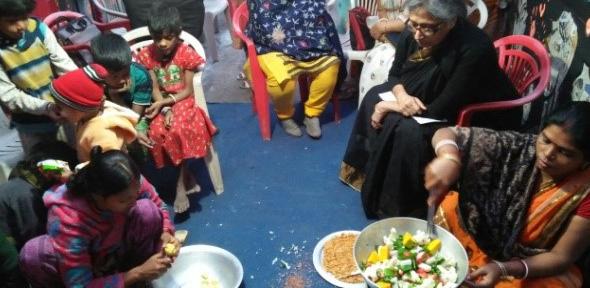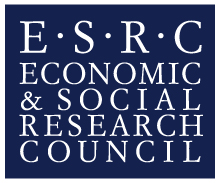
Thanks to funding from the ESRC Impact Acceleration Account, a chance meeting with nutrition education charity NNEdPro in Cambridge has enabled Professor Ianthi Tsimpli to take her research out of the classroom and into the teaching kitchens of Kolkata’s slums. It’s food for thought.
At first glance, a nutrition education charity’s work appears to have little in common with that of Ianthi Tsimpli, Professor of English and Applied Linguistics at Cambridge. But when NNEdPro approached Cambridge Language Sciences Interdisciplinary Research Centre, where Tsimpli is co-director, their meeting led to an innovative new educational intervention in the slums of West Bengal.
“It was a very happy accident,” she recalls. “My research is on the cognitive effects of multilingualism, so I’d never have thought of getting involved in nutrition education.” Despite their differences, Tsimpli and NNEdPro – the Need for Nutrition Education/Innovation Programme Global Centre for Nutrition and Health – have a shared interest in India’s slum communities, where NNEdPro uses teaching kitchens to raise awareness of making cost-effective, nutritious meals and Tsimpli runs a major research project in Indian primary schools.
“In India, multilingualism is the norm, and my project focuses on the effect of multilingualism on children’s cognitive and learning skills. NNEdPro is looking at nutrition education. The link is that we both work in slum communities – that’s our shared ground,” she explains.
Together, they applied for ESRC IAA funding. “I found out about the funding via email and because I work closely with the ESRC it attracted my attention, but it was a little unorthodox because rather than joint research culminating in impact, it started from separate research among similar populations where the key ingredient was education,” Tsimpli says.
The IAA funding enabled them to convene two workshops in Kolkata, bringing together international speakers with local health practitioners, policy makers, NGOs and community representatives. The workshops helped raise awareness of NNEdPro’s Teaching Kitchen’s project, which empowers local communities by sharing knowledge and skills, showing that nutrition education can impact learning and literacy skills as well as improving diet-related health.
“Teaching Kitchens operate on a ‘see one, do one, teach one’ model, so I am interested in how this teaching process enhances women’s literacy skills. One of the things that builds better literacy skills is transferring knowledge, so Teaching Kitchens have the potential to increase learning and understanding among these women, most of whom are semi-literate,” she says.
As well running two successful workshops in 2017 and 2018, the IAA funding enabled additional Teaching Kitchen volunteers to be trained, magnifying the reach of the project through its ‘see one, do one, teach one’ model, and helping launch a mobile Teaching Kitchen in 2018. Children too are benefiting from the project, because many accompany their mothers to the Teaching Kitchens; keen to talk about what they have learned, the children may gain cognitively as well as nutritionally.
As well as its impact in India, the IAA funding has had important results for Tsimpli’s research, enabling her to forge links with health and nutrition experts and demonstrating how academics’ research can have impact in new, unexpected areas well beyond their fields. “What I find most rewarding about this interdisciplinary work is discovering how my knowledge and expertise can benefit people in very different contexts,” she explains.
It’s also opened up new perspectives on her own research. “Cognition and mental flexibility might be an effect of developing literacy in any domain, including nutrition education, so the question for me is what ingredients in this type of education can benefit the areas of cognition and language that I already work on?” she asks. “And through conversations at the workshops, scientists asked me whether I collect nutrition information from the children in my study – basic information such as height and weight. I didn’t – but next time I will.”
Finally, the funding is having a wider impact in Cambridge. The ESRC has approved a new PhD studentship on cognition and nutrition education which, together with the growing impact – and interest in – Teaching Kitchens in India has all flowed from IAA funding. “The funding was essential,” Tsimpli concludes. “It’s small but goes a long way, especially if you can use existing infrastructure as we did here. Without the funding, I would never have been involved in this project, and I needed NNEdPro to appreciate how I could contribute.”
| ESRC IAA Impact Fund Project: |
The impact of an education intervention in West Bengal (India): Towards understanding the effects of nutrition in poorly resourced settings on literacy, learning and attention skills. |
| Project Investigator: |
Professor Ianthi Tsimpli (Department of Theoretical and Applied Linguistics) |
| Partner Organisations: | Global Centre for Nutrition and Health NNEdPro |
| Project duration: | April 2017 - February 2018 |

